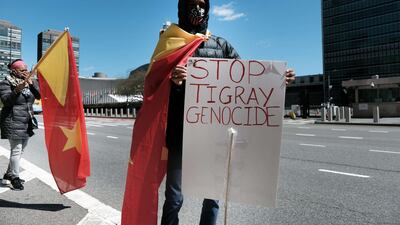Congress increased pressure on the Biden administration over the humanitarian situation in the Tigray region of Ethiopia this week, urging it to move more forcefully and impose sanctions on the involved parties, including Addis Ababa.
A letter from Gregory Meeks, Democratic chairman of the House foreign affairs committee, and Republican member Michael McCaul was sent on Tuesday to US Secretary of State Antony Blinken and Secretary of Treasury Janet Yellen.
The two called for sanctions to be imposed on those fuelling the fighting in Tigray.
Fighting since November between Ethiopian troops and the Tigray People's Liberation Front has killed more than 50,000 and displaced hundreds of thousands, Ethiopia's three opposition parties say.
The UN estimated on Tuesday that 2.2 million people are in need of humanitarian assistance, while human rights organisations have reported atrocities including rape and extrajudicial killings.
Last week, Ethiopia's Prime Minister Abiy Ahmed admitted to the presence of Eritrean troops in Tigray fighting on the side of his government and committed to withdraw them from the region. This has yet to happen.
Congress is urging the Biden administration to do more to end the fighting.
“We condemn in the strongest possible terms reported atrocities and gross violations of human rights committed against civilians, including rape, torture, forced displacements and disappearances, acts of ethnic cleansing, extrajudicial killings, the looting and destruction of medical facilities and restricted access to aid,” Mr Meeks and Mr McCaul wrote.
“We urge the administration to utilise all available tools, including Global Magnitsky authorities and other targeted sanctions, to hold parties accountable for their actions and bring an end to this crisis."
Sanctions can be used to punish human rights abuses under the Magnitsky Rule of Law Accountability Act passed by Congress in 2012.
The letter implicates all sides in the abuses and says “additional targeted accountability measures cannot wait”.
It also threatens problems for the future of relations between the US and Ethiopia if the situation did not improve.
“While we remain committed to the important bilateral relationship between the United States and Ethiopia, this conflict jeopardises shared political, economic and security priorities,” Mr Meeks and Mr McCaul wrote.
In February, the Biden administration unlinked a suspension of $272 million in aid to Ethiopia for the Nile dam crisis and tied it instead to current "developments", including the Tigray conflict.
Speaking to Congress in March, Mr Blinken described the situation in Tigray as “ethnic cleansing”.
On Tuesday he made reference to sexual assaults and continued killings in the region.
“The report we’re releasing today shows that the trend lines on human rights continue to move in the wrong direction," Mr Blinken said at the launch of the State Department's annual human rights report.
"We see it in the killings, sexual assaults and other atrocities credibly reported in Ethiopia’s Tigray region."
Cameron Hudson, a senior fellow with the Atlantic Council’s Africa Centre, said Washington was following a gradual approach in increasing pressure on Ethiopia.
“We [the US] have already suspended our development assistance and our security assistance," Mr Hudson said.
"Those moves seem to have very little impact in changing [Addis Ababa's] approach to the conflict in Tigray. The next level of pressure is clearly going to be direct punitive measures."
The letter is an indication of possible sanctions by the departments of State and Treasury.
“This likely will translate into sanctions unless Washington starts to see greater movement on the key issues it is asking for changes on, namely the withdrawal of Eritrean and Amhara [ethnic group] forces, the launch of the international human rights investigation, unhindered humanitarian access and some sort of domestic political dialogue,” Mr Hudson said.
He saw the possibility of the US Treasury delaying or denying third-party aid to Ethiopia.
“The Treasury does two big things that affect US policy on Ethiopia," Mr Hudson said.
"It administers US sanctions and it controls the US vote at the World Bank and International Monetary Fund.
"The US has leverage in denying or delaying Ethiopia multilateral financing and assistance and not just bilateral assistance.”
In its report on Tuesday, the UN Office for the Co-ordination of Humanitarian Affairs said about “1.3 million children need protective services and safe education in Tigray and neighbouring areas”.
The UN agency expressed concern over reports of rape and other breaches of human rights in the Tigray region.
“There are more than 500 self-reported rape cases so far,” it said.


